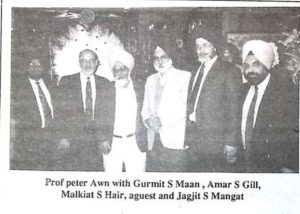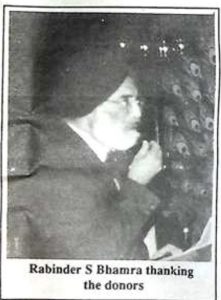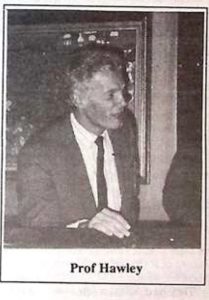NEW YORK: Sikh Studies program a Columbia University is extended for a three Years term beginning 1992. During this Period, the Sikh community is committed to raise sufficient funding to put the program on a permanent basis.
A fund raising dinner for the program, which was attended by 150 Sikh ladies and gentlemen of the tri-state area, was held in the Mughal Room of Ramada Inn in New York City.
The gathering included representative of Several local Gurdwaras and organization, Labh Singh Bhangu (Mid-Hudson Sikh Cultural Society, Fishkill, NY), Dr. Sarwant Kaur Dhamoon (Sikh Women International Organization), Kamikar Singh Grewal (Sri Guru Singh Sabha, Glenrock, NJ), Maikit Singh Heir (Garden State Sikh Association, Bridge Water, NJ), Swinder Singh Josen (Singh Sabha of New York, Flushing NY), Pritpal Singh Kochhar (Sikh Heritage Foundation), Harsimran Singh Sabharwal (Sikh Forum, Plainview,NY) Jagjit Singh Mangatand other leaders from the Sikh Cultural Society of Richmond Hill. Raj Harbans Kaur, Arjit Singh Mahal. Baljit Singh Rana, Mr. & Mrs. ManjitSingh Shukla, and Dr. Pritam Singh were also present.
Amar Singh Gill, the Grewal family of New Jersey, and Gurmit Singh Mann, who have already made large contributions, pledged their continued support for the program.
Professor John $.Hawley, Director of the Southern Asian Institute of Columbia University, was the key note speaker of the evening. He detailed the progress of the Sikh Studies program at Columbia and urged the Sikh community to continue their support. According to him .
The growth of Sikh Studies at Columbia University since 1988 has been a remarkable phenomenon. In 1988 Columbia had in place most of the critical infrastructure to make an erective program of Sikh Studies possible—an excellent program in South Asian Studies (currently rated the best in the nation), a long-term commitment to the study of Asia and to its integration into the undergraduate core curriculum, a Religion Department that ranks among the best in the country, and a student body in which Sikhism was increasing well represented. Yet Columbia’s curriculum was silent about Sikhism in any explicit way.
All that Changed in consequence of two important forces: the arrival of Gurinder Singh Mann (M.A, Harvard) i in our midst as a doctoral candidate, and the dedicational of the Sikh Cultural Society of Richmond Hill to expanding and improving the stud of Sikhism at Columbia, It has been the vision of both Mann and the Sikh Cultural Society that Columbia would be the natural location for the nation’s preeminent program in Sikh Studies. At the end of 1991 that objective is within reach. Thanks to the support of the Sikh community, we have the strongest Sikh Studies program anywhere in the United States. Here is it elements:
Curriculum. Columbia offers courses or Sikhism, on the theology of the Guru Granth Sahib, on the Sikh component in the religious and social evolution of modern South Asia, and on elementary and intermediate Punjabi.
Conference. The Southern Asian Institute and the Sikh Cultural Society have hosted two important conferences: “Sikh Studies: The American Agenda” (1989)and “Sikh Theology” (1990).
Publications, J.S. Hawley and G.S. Mann have edited Studying the Sikhs, a state-of the-field volume in, ended to help integrate the study of Sikhism into a range of academic disciplines. At present, two presses are bidding to act as publisher.
Sikh Student Association. Established in 1988, it takes its place alongside other Student religious organization at Columbia and acts outside the university as well.
A national—and_ international— resource. With Columbia as a base, G.S. Mann has presented Sikh perspectives in public forums nationwide: scholarly conferences, interfaith events, various Sikh forums, and local and national TV.
A drive is now under way to endow a permanent chair in Sikh studies at Columbia. If the drive succeeds, the successes listed above, which were so carefully purchased and designed by the Sikh community, will be protected in perpetuity. They will last and grow.
Professor Peter J.A wn, Chairman of the Department of Religion Columbia University endorsed the views of Professor Hawley, and said that the Sikh Studies Program is a valuable part of the work of his department. He said that he looks forward to seeing more Sikh students at Columbia in the years to come, and urged the Sikh parents to consider sending their children there.
Gurinder Singh Mann, who has been closely, associated with the program since its inception, called the fund raising dinner, a historic event. The event, for him, was a reenactment of the planning of the establishment of the Khalsa College, Amritsar, exactly a century ago, as well as a land mark of the progress of the community in the last 100 years. He said that, Sikhism, a regional religion at the end of the 19th century, is seeking its rightful place on the stage of world religions.
Satjivan Singh Khalsa of Sikh Dharma made a hearty appeal in support of the Sikh Studies program, and claimed that the Columbia Sikh Studies program is the best gift we can offer to the coming generations of Sikhs in the United States, Dr. Inderjit Singh of New York University emphasized the importance of the program and congratulated the community for establishing it one of the most outstanding institution in the United States.
Baldev Singh spoke about the importance of the program for the Sikh community, and he offered to donate $5000 a year for the program until it is put on a permanent basis. He explained that the Sikh Cultural Society of Richmond Hill which began the Program decided to broaden its support base. The Columbia program has now become a national Sikh Studies program, and the requests for help, according to him, have received very encouraging response from Sikh organizations and individuals all over the country.
Rabinder Singh Bhamra went over some of the misgivings expressed by some people about the program. He told the audience that an advisory committee was constituted to assess the working of the program by the Board of Trustees of the Sikh Cultural Society; He said that the committee went over the details of the program and was fully satisfied with its contents and programs, and strongly recommended it continuation.
He expressed his gratitude to all the donors, the detailed list will soon be made public. He expressed his special thanks to the Sikh Foundation of Palo Alto and its Chairman Dr. Narinder Singh Kapani for his help. Dr. Kapanis letter expressing his Strong support and good wishes for the Program was read to the audience and aroused a prolonged applause.
Mr. & Mrs. Jagjit Singh Mangat, who helped organizing the dinner and welcomed the guests, were especially thanked by the speakers. Enquiries about the program should be directed to Rabinder Singh Bhamra, Tel. (516) 334-6696, or, Gurinder Singh Mann (212) 864-4996.



Article extracted from this publication >> December 20, 1991